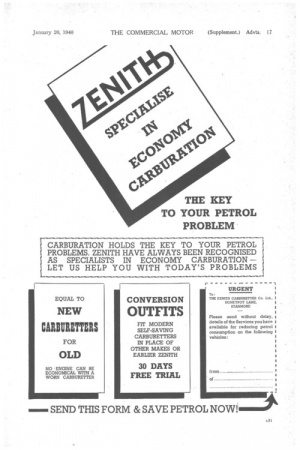Advice on Training Transport Executive Officers
Page 41

If you've noticed an error in this article please click here to report it so we can fix it.
By J. A. Dunnage,
Secretary, Industrial Transport Association. T"year 1939 is greeted by members of the Industrial Transport Association with optimism. The Association's distinctive policy has been such that, from its early days, it has both attracted and generated the earnest efforts, deep enthusiasm and loyalty of many of the leading industrial transport officers of the country. Its systematic activities have been designed to raise the professional status of its members and increase their value to British industry and to the whole nation,
The Association's council has always realized that its brief, three-word title might not fully reveal, to the cursory gaze, those special purposes that distinguish it from other worthy bodies, the activities of which are chronicled in The Commercial Motor. Hence nobody was surprised when this Association was at times erroneously regarded as " just another road transport association " with perhaps little warrant for muscling in on territory already well covered. With some amusement it was noted that others looked askance at us as having railway leanings.
"The Commercial Motor" Helped.
These mutually contradictory ideas have long since been cancelled out, and the part spontaneously played by The Commercial Motor in removing misconceptions will always be remembered with pleasure and gratitude.
To-day It is widely realized that we stand as the personal professional organization of industrial traffic managers and officials—executives whose primary mission is the effective purchase and administration of transport service of all types, on behalf of industry. Twenty-four branches are in regu. lar operation and are contributing to the wider vision of our members, The social side is not neglected and the Association has been peculiarly successful in its national and branch officers,. who hiave developed an in. formal, friendly and helpful atmosphere in the meetings. Annual congresses have proved increasingly successful in all aspects, and preliminary work which will doubtless lead to another big success in June, 1939, is already in hand in Norwich, Through the quiet spade work of the Association there is now growing interest, in educational circles, in the need for the systematic training of a new generation of industrial transport officers., The creation of new classes is now constantly being reported and the further progress being planned for 1939 should mean that many more young entrants to the profession will have their way made much more clear for them than it was for their seniors. The next of the Association's annual examinations will be held on May 5 and 6, entries closing on March 6.
Increasing value is also now attaching to the Association's Appointments. Department, a branch which functions confidentially in the interests of members having vacancies or requiring better posts. Obviously the department cannot create vacancies, but it is making real progress in securing opportunities to fill those that arise, by the submission of a small number of "hand-picked" candidates, and is thus saving trouble and expense to all concerned, Increasing Scope for Traffic Experts.
The commencement of 1939 has seen the inauguration of branches at Southampton. Bristol and Wolverhampton and several additional branches are in prospect. Each branch is bringing the benefits of membership more adequately before traffic men, and extending them to an ever-widening circle. The limits of expansion are nowhere within sight. "tndeed, the increasing technicality of the whole subject must mean that still more recruits will be required for the profession and that the scope for industrial transport experts will be greater yet.
Although transport problems of vital importance to the nation will have to be faced by our members, there seems no reason to doubt but that, aided by their corporate activities under our mgis, they will face these problems with quiet confidence and contribute during 1939 their full quota to national advancement.




















































































